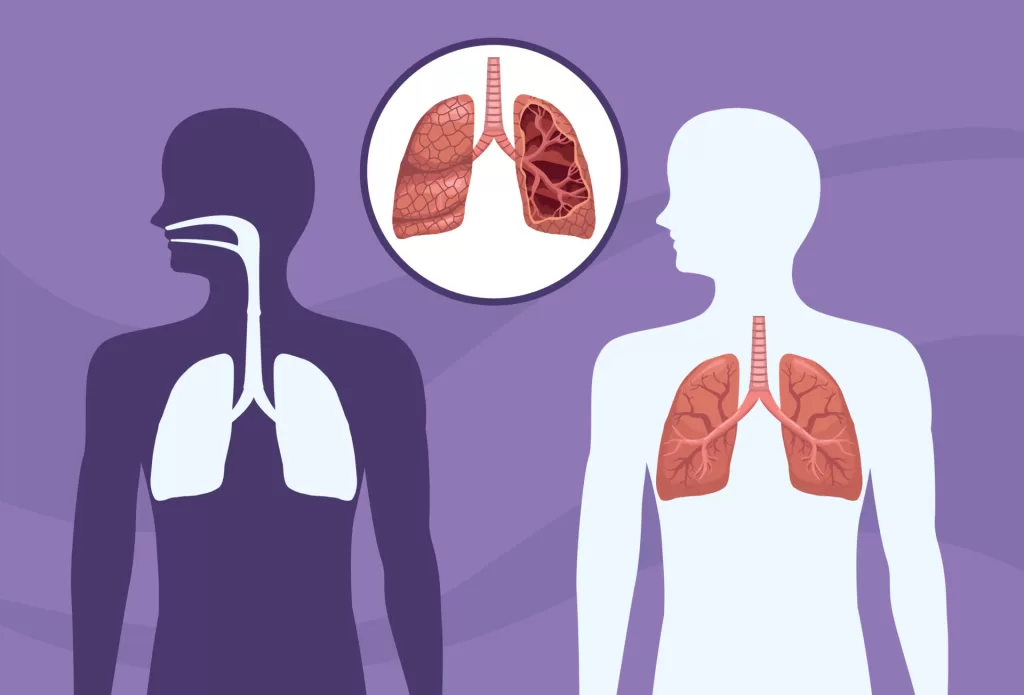What are the Stage 4 Mesothelioma Cancer Survival Rates?
In managing health and concerning Stage 4 Mesothelioma Cancer Survival Rates, Stage 4 Malignant Mesothelioma is the most advanced stage of the disease. It indicates that the cancer has spread to distant parts of the body. The survival rates for Stage 4 Malignant Mesothelioma are generally low due to the extensive spread of the cancer.
According to the American Cancer Society, the 5-year relative survival rate for distant (stage 4) malignant pleural mesothelioma is about 7%. This means that people with Stage 4 Malignant Mesothelioma are, on average, about 7% as likely as people without cancer to live for at least 5 years after being diagnosed.
It’s important to note that these statistics are based on historical data and do not take into account recent advances in treatment or individual factors such as a person’s overall health, response to treatment, and type of mesothelioma. Survival rates are also used by doctors to discuss your prognosis, but they cannot predict individual outcomes.
What Stage 4 Malignant Mesothelioma Cancer Means
Stage 4 Malignant Mesothelioma cancer is an advanced and critical phase where malignant cells originating in the protective lining of the lungs, abdomen, or heart have spread extensively to distant organs or tissues. At this stage, the cancer is often considered inoperable and challenging to treat effectively.
Understanding Survival Rates For Stage 4 Mesothelioma is crucial as it provides you and your families with realistic expectations regarding life expectancy and aids you in making informed decisions about treatment options and quality of life. This post aims to shed light on the significance of Survival Rates For Stage 4 Mesothelioma, exploring factors that may influence these rates and empowering you and other readers with valuable information to navigate this challenging phase of the disease.
Getting to Know Stage 4 Mesothelioma
Stage 4 Malignant Mesothelioma represents an advanced and often incurable phase of the disease, where cancer cells originating in the mesothelial lining of the lungs, abdomen, or heart have extensively spread to distant organs or tissues. Characterized by widespread metastasis, Stage 4 Malignant Mesothelioma is marked by the invasion of neighboring structures, making surgical intervention challenging.
The cancer has typically progressed beyond the point of curative treatment options, and the primary goal shifts towards palliative care to alleviate symptoms and improve quality of life. Symptoms at this stage may include severe respiratory distress, chest and abdominal pain, fluid accumulation, weight loss, and fatigue. The progression to stage 4 is often insidious, with an initial misdiagnosis or delayed detection contributing to the advanced state.
Treatment options are limited due to the extensive spread of the cancer, and while palliative measures can provide relief, a cure is rarely achievable. The challenges of treating Stage 4 Malignant Mesothelioma underscore the importance of early detection and intervention to improve outcomes and enhance the quality of life for those affected by this aggressive disease.
Factors Affecting Stage 4 Mesothelioma Cancer Survival Rates
Here are factors affecting Survival Rates For Stage 4 Malignant Mesothelioma:
Age
Younger patients tend to have better Stage 4 Mesothelioma Cancer Survival Rates than older patients because they are more likely to tolerate aggressive treatments and have fewer comorbidities. The median survival for patients under 50 years old is 20 months, compared to 12 months for patients over 75 years old.
Overall health
Patients with good general health and performance status have a better Stage 4 Malignant Mesothelioma prognosis than patients with poor health and functional impairment. Factors such as weight loss, smoking, and chronic diseases can affect survival outcomes.
Type of mesothelioma
There are different types of Mesothelioma, based on the location and cell type of the tumor. Pleural mesothelioma affects the lining of the lungs and is the most common and aggressive form. Peritoneal mesothelioma affects the lining of the abdomen and has a better survival rate than pleural mesothelioma. Pericardial mesothelioma affects the lining of the heart and is the rarest and most fatal form. The 5-year survival rate for stage 4 pleural mesothelioma is 12%, while the 5-year survival rate for stage 4 peritoneal mesothelioma is 65%.
Treatment options
The treatment options for Stage 4 Malignant Mesothelioma are limited, as the cancer has spread to distant organs and is not resectable. However, some patients may benefit from palliative treatments, such as chemotherapy, radiation therapy, surgery, or immunotherapy, to reduce symptoms and improve their quality of life. The choice of treatment depends on your preferences, goals, and eligibility. Some patients may also opt for clinical trials, which offer access to experimental therapies that may improve survival.
These factors can impact prognosis and survival outcomes by affecting the tumor growth, the response to treatment, and the complications of the disease. However, it is important to note that these factors are not definitive and that each patient’s case is unique. Survival rates are based on statistics from large groups of patients, and cannot predict the individual outcome of any patient. Therefore, patients should consult with their doctors, who can provide a more personalized and accurate assessment of their prognosis.
How Long Can You Live With Stage 4 Mesothelioma?
Stage 4 Malignant Mesothelioma is considered by doctors as an advanced stage of the disease, where cancer has spread extensively to distant organs and tissues. Survival rates at this stage are typically lower compared to earlier stages. The prognosis for individuals with Stage 4 Malignant Mesothelioma varies depending on various factors. These include your overall health, age, treatment options, and how the cancer responds to the treatment administered.
On average, the life expectancy for individuals diagnosed with Stage 4 Malignant mesothelioma is generally shorter, often measured in months rather than years. However, some patients may respond well to treatment and experience longer survival times, while others may have a more aggressive form of the disease with a shorter life expectancy.
If you are an Individual diagnosed with Stage 4 Malignant Mesothelioma, you need to work closely with your healthcare physician to explore all available treatment options, including surgery, chemotherapy, radiation therapy, immunotherapy, and palliative care, to manage symptoms and improve the quality of your life. Additionally, participating in clinical trials may offer access to innovative therapies that could potentially extend survival.
Ultimately, the prognosis for Stage 4 Malignant Mesothelioma remains challenging, but advancements in treatment and supportive care continue to provide hope for you, emphasizing the importance of individualized treatment plans and ongoing medical support.
What is the Prognosis for Malignant Mesothelioma?
Determining the prognosis for malignant mesothelioma involves several steps, including:
- Diagnosis: The first step is to confirm the diagnosis of malignant mesothelioma through imaging tests such as X-rays, CT scans, MRI scans, and biopsies. A biopsy, where a small sample of tissue is removed and examined under a microscope, is essential for determining the type and stage of mesothelioma.
- Staging: Once diagnosed, mesothelioma is staged to determine the extent of the cancer spread. Staging helps oncologists understand the prognosis and plan appropriate treatment. Mesothelioma staging typically involves imaging tests, such as CT scans and PET scans, as well as surgical exploration if necessary.
- Assessment of Prognostic Factors: Several factors influence the prognosis of malignant mesothelioma, including your age, overall health, type of mesothelioma (e.g., pleural, peritoneal), histology (e.g., epithelioid, sarcomatoid, biphasic), stage of the disease, and response to treatment.
- Consultation with Healthcare Team: You should consult with a multidisciplinary team of healthcare professionals experienced in treating mesothelioma, including medical oncologists, surgeons, radiation oncologists, and supportive care specialists. The healthcare team will provide information about treatment options, potential outcomes, and supportive care.
- Development of Treatment Plan: Based on the patient’s characteristics and the stage of the disease, the healthcare team will develop a personalized treatment plan. Treatment options may include surgery, chemotherapy, radiation therapy, immunotherapy, targeted therapy, and/or participation in clinical trials.
- Monitoring and Follow-Up: Throughout the treatment process, patients will undergo regular monitoring and follow-up appointments to assess the response to treatment, manage side effects, and adjust the treatment plan as needed. Imaging tests and other diagnostic procedures may be performed to evaluate disease progression or recurrence.
- Prognosis Evaluation: Over time, the prognosis for malignant mesothelioma may be reassessed based on the patient’s response to treatment, disease progression, and overall health status. The healthcare team will provide updates on the prognosis and discuss any changes in treatment options or supportive care needs.
Mesothelioma Stage 4 Symptoms
The symptoms of Stage 4 Malignant Mesothelioma can vary depending on its location in your body and the extent of metastasis, but here are five major symptoms commonly associated with this stage:
- Severe Chest Pain: Stage 4 mesothelioma often presents with worsening and debilitating chest pain. This pain can result from tumor invasion into the chest wall, ribs, or surrounding tissues. The pain may be sharp, stabbing, or dull, and it may worsen with movement or deep breathing. Pleural effusion, a common complication in mesothelioma where fluid accumulates in the pleural cavity, can also contribute to chest discomfort.
- Shortness of Breath: As mesothelioma progresses to Stage 4, it can lead to increasing difficulty in breathing with chest pain or shortness of breath. This symptom may be caused by the tumor pressing against the lungs, pleural effusion compressing lung expansion, or metastasis to the lungs impairing respiratory function. Shortness of breath can worsen with physical activity and may become severe and limiting.
- Unintended Weight Loss: Stage 4 Malignant Mesothelioma is often associated with unintentional weight loss, which can occur due to various factors such as loss of appetite, metabolic changes associated with cancer, or the body’s response to the disease. Significant weight loss can weaken your body, exacerbate fatigue, and impair overall functioning.
- Fatigue and Weakness: Fatigue is a common symptom experienced by individuals with Stage 4 Malignant Mesothelioma. It can result from the body’s efforts to fight the disease, the metabolic demands of cancer growth, anemia, or side effects of treatment. Fatigue can be severe and debilitating, impacting daily activities and quality of life.
- Swelling and Pain in Other Areas: In Stage 4 Malignant Mesothelioma, cancer cells may metastasize to other organs and tissues beyond the chest cavity, leading to symptoms such as swelling, pain, or discomfort in areas such as the abdomen, abdomen, bones, or lymph nodes. For example, metastasis to the liver or bones can cause abdominal pain, swelling, or bone pain.
Can Stage 4 Mesothelioma be Cured?
Stage 4 Malignant Mesothelioma, being an advanced stage of the disease where cancer has spread extensively to distant organs and tissues, is typically not considered curable with current standard treatments. However, there may be exceptions depending on individual circumstances, such as the patient’s overall health, response to treatment, and availability of novel therapies or clinical trials.
Treatment for Stage 4 Malignant Mesothelioma focuses on managing symptoms, improving quality of life, and prolonging survival. Treatment options may include chemotherapy, radiation therapy, immunotherapy, targeted therapy, and palliative care interventions. These treatments aim to slow the progression of the disease, relieve symptoms, and enhance the patient’s comfort.
Adding on to that, participating in clinical trials may offer access to experimental treatments or novel therapeutic approaches that could potentially improve outcomes for patients with Stage 4 Malignant Mesothelioma. These trials may involve innovative treatments such as new chemotherapy regimens, immunotherapy combinations, targeted therapies, or emerging treatment modalities like gene therapy or immunomodulation.
While Stage 4 Malignant Mesothelioma is typically associated with a poor prognosis, advancements in mesothelioma research and treatment are ongoing, providing hope for improved outcomes and better quality of life for patients. Individuals diagnosed with stage 4 mesothelioma need to work closely with a multidisciplinary healthcare team experienced in treating this disease to explore all available treatment options and supportive care measures tailored to their specific needs and circumstances.
What is the Relationship Between Mesothelioma Stage 4, Chest Pain and Angina
Mesothelioma Stage 4 and chest pain, including angina, can be related in certain situations, although they arise from different underlying causes.
- Stage Malignant 4 Mesothelioma and Chest Pain: In advanced stages of mesothelioma, such as Stage 4, chest pain can occur due to several reasons. Firstly, mesothelioma tumors can invade and irritate surrounding tissues, including the chest wall, leading to localized pain. Additionally, mesothelioma can cause pleural effusion, a buildup of fluid in the pleural cavity surrounding the lungs, which can exert pressure on the chest and cause discomfort or pain. Furthermore, metastasis of mesothelioma to other organs, such as the bones or lymph nodes in the chest area, can also contribute to chest pain.
- Angina: Angina Pectoris is a type of chest pain caused by reduced blood flow to the heart muscle due to narrowed or blocked coronary arteries. While angina is not directly caused by mesothelioma, certain factors associated with mesothelioma, such as smoking or pre-existing cardiovascular disease, can increase the risk of developing angina. Additionally, treatments for mesothelioma, such as chemotherapy or radiation therapy, may have cardiovascular side effects that could exacerbate angina symptoms in susceptible individuals.
While mesothelioma Stage 4 and chest pain, including angina, may be related indirectly due to factors such as tumor invasion, pleural effusion, or treatment side effects, they stem from distinct underlying causes. It’s essential for you if you’re experiencing chest pain, especially if it is severe or persistent, to seek medical evaluation to determine the cause and appropriate management.
Can Stage 4 Mesothelioma Go into Remission?
Generally speaking, achieving remission in Stage 4 Malignant Mesothelioma is rare because this stage of the disease is characterized by extensive spread to distant organs and tissues, making complete eradication of the cancer challenging. However, there may be cases where certain treatments can lead to a partial response, stabilization of the disease, or temporary remission, where the cancer becomes undetectable or inactive for a period.
Treatment approaches for Stage 4 Malignant Mesothelioma typically focus on palliative care to manage symptoms, improve quality of life, and prolong survival rather than aiming for a cure. Treatments such as chemotherapy, radiation therapy, immunotherapy, targeted therapy, and palliative procedures can help alleviate symptoms, slow the progression of the disease, and enhance your comfort.
In some instances, you may experience a positive response to treatment, leading to a reduction in tumor size, alleviation of symptoms, and improvement in your overall health and well-being. Although complete remission in Stage 4 Malignant Mesothelioma is uncommon, partial remission or disease stabilization may still provide significant benefits by extending survival and improving quality of life.
If you are an Individual with Stage 4 Malignant Mesothelioma, you need to work closely with your healthcare team to explore all available treatment options, including participation in clinical trials, and to receive comprehensive supportive care to address your physical, emotional, and psychosocial needs. While achieving remission may be challenging in the advanced stages of mesothelioma, advancements in research and treatment continue to offer hope for improved outcomes and better management of the disease.
Is Stage 4 Always Terminal?
Mesothelioma Stage 4 is often considered advanced and carries a poor prognosis, but it is not necessarily always terminal in the immediate sense. While the term “terminal” typically implies an incurable condition with a limited life expectancy, you need to understand that prognoses are not absolute and can vary widely from person to person.
Some individuals diagnosed with Stage 4 Malignant Mesothelioma may respond well to treatment, experience disease stabilization, or achieve periods of remission, during which the cancer is inactive or under control. However, it’s crucial to acknowledge that Stage 4 mesothelioma is associated with significant challenges and a higher likelihood of disease progression.
The goal of treatment for Stage 4 Malignant Mesothelioma often shifts towards palliative care, which focuses on managing symptoms, improving quality of life, and providing comfort. Palliative care interventions can help alleviate pain, manage side effects of treatment, address
Conclusion
Early detection and treatment are paramount for improving your survival outcome if you are an individual with Stage 4 Malignant Mesothelioma. Given the advanced nature of the disease at this stage, timely intervention becomes challenging, making it crucial to catch mesothelioma in its earlier phases.
Early diagnosis allows for more effective treatment options, potentially increasing the chances of successful intervention and improved quality of life. if you suspect exposure to asbestos or experience symptoms associated with mesothelioma, you should seek prompt medical attention and advocate for thorough diagnostic evaluations.
Resources such as the Mesothelioma Applied Research Foundation and the American Cancer Society can offer you valuable information, support, and guidance if you’re affected by Stage 4 Malignant Mesothelioma. Access to reliable information and a supportive network can empower you to make informed decisions, enhance your understanding of treatment options, and navigate the challenges associated with this aggressive form of cancer.
Explore www.medicalantidote.com for a wealth of health articles.




Hey! I could have sworn I’ve been to this blog before but after browsing through
some of the post I realized it’s new to me. Nonetheless, I’m definitely happy
I found it and I’ll be book-marking and checking back
often!